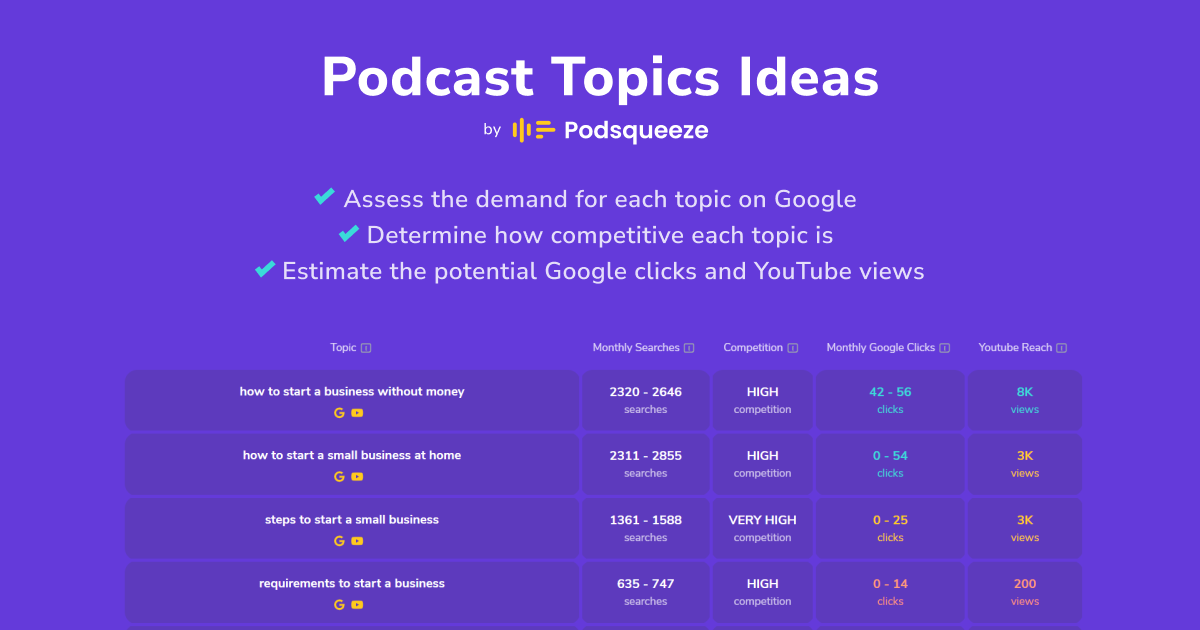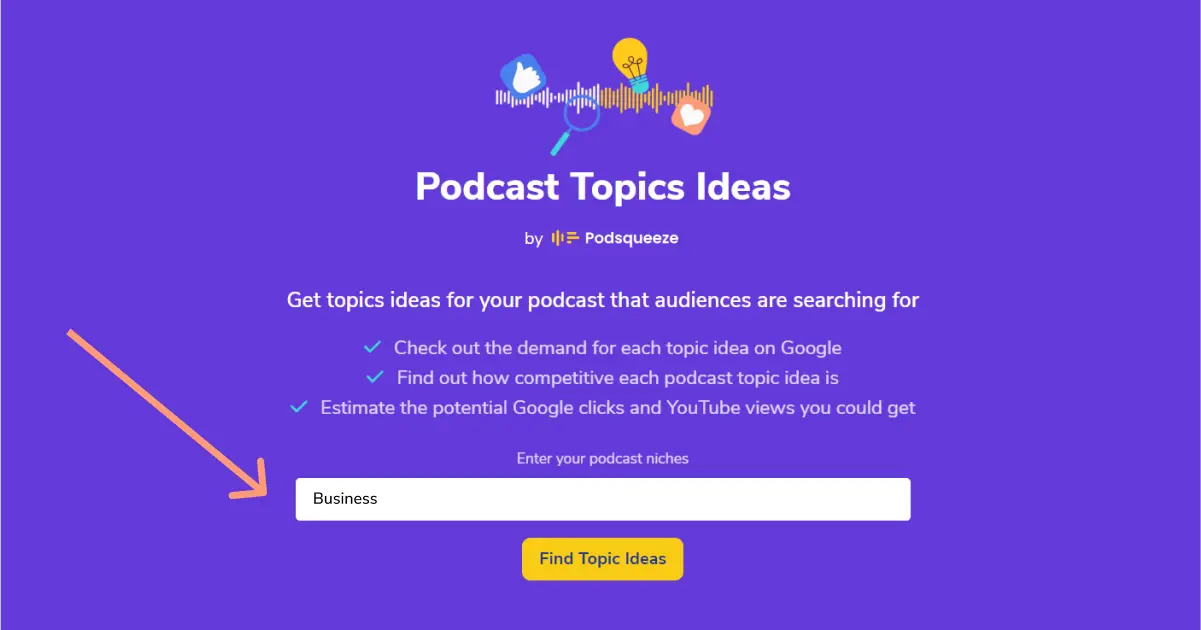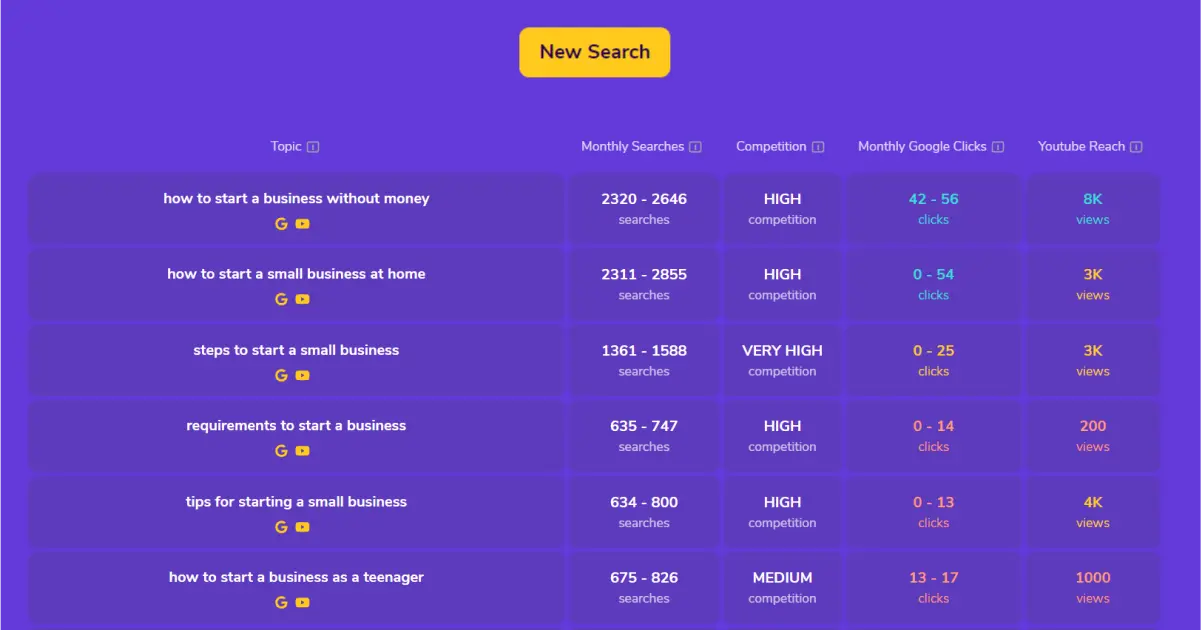BLOG ARTICLE
How to find good podcast topics to talk about
Last updated: 7/27/2024
Last updated: 7/27/2024
Creating a sucessful podcast isn't just about picking up a mic and talking about whatever comes to mind.
To truly connect with an audience and grow your listenership, it's crucial to choose your podcast topics ideas strategically, based on what people are actively searching for on Google or finding relevant on content platforms like youtube.
This method ensures that your episodes don't just float in the digital ether but reach an interested audience looking for your content.
Even though using relevant keywords benefits your content on both Google and YouTube, the dynamics of these platforms differ significantly.
That's why we created a straightforward, free podcast topic research tool, that not only generates topic ideas tailored to your niche but also analyzes their performance on Google and YouTube, helping you prioritize which topics to focus on next.

What to look for when researching topics to talk about in a podcast
-
Choosing content topics to rank on Google
For podcasters and creators who want to bring their website to the first positions on Google, targeting topics with high search volume and low competition is generally the best strategy.
High search volume indicates a substantial interest in the topic, suggesting that people are actively looking for information or discussions in this area.
When the competition is low, it means there are fewer sources covering these topics, giving you a clearer path to the top of search results.
This approach is particularly effective for newer websites that might not yet have the authority or backlink profile to compete against established sites on more competitive topics.
By focusing on less saturated areas, you can more quickly establish a presence and start drawing organic traffic to your site. As your website gains credibility and authority, you can begin to tackle more competitive areas with confidence.
-
Choosing content topics for Youtube views
On YouTube, the dynamics are a bit different. The platform's algorithm tends to favor content that engages users, regardless of how many other channels are covering similar topics.
In fact, entering into areas where other creators are performing well can actually be advantageous. When your content aligns with what's already popular, it increases the likelihood of being recommended alongside those successful peers.
YouTube's recommendation system works to keep viewers engaged and watching. So, producing content in topics where viewers already show high engagement can lead to your episodes being promoted by YouTube itself. This strategy uses the platform's algorithm to extend your reach, pulling viewers from related videos and increasing your visibility.
For podcasters, this means that researching and understanding which types of content perform well on YouTube can guide you in creating episodes that not only interest your audience but are also more likely to be featured in recommendations.
By carefully selecting your podcast topics based on these strategic considerations—high search volume and low competition for Google, and wisely engaging with competitive topics on YouTube—you can effectively enhance your visibility and audience engagement across platforms.
Using a podcast research tool to plan your next content
The easiest way to find the best topics for your podcast and YouTube channel is to use a tool that handles the brainstorming while analyzing their performance on Google and YouTube.
To start, visit our podcast topics finder and enter your podcast or channel's niche. Feel free to conduct multiple searches exploring related niches as well— eg. business, marketing, leadership, entrepreneurship, etc.

In just a few seconds, our topic generator will suggest the best topics to cover within your niche, complete with details about monthly Google searches, competition levels, and even an estimate of the clicks your website might receive. These estimates are based on a variety of factors including competition intensity, average domain rating, Google ranking CTRs, and more.
It will also provide an estimate of the YouTube views you might expect over the next six months, based on the performance of similar videos from average-sized channels over the last six months.

Ultimately, you'll need to decide which platform to prioritize, or you may choose to focus on topics that perform well across both platforms.
Repurpose your podcast content with AI